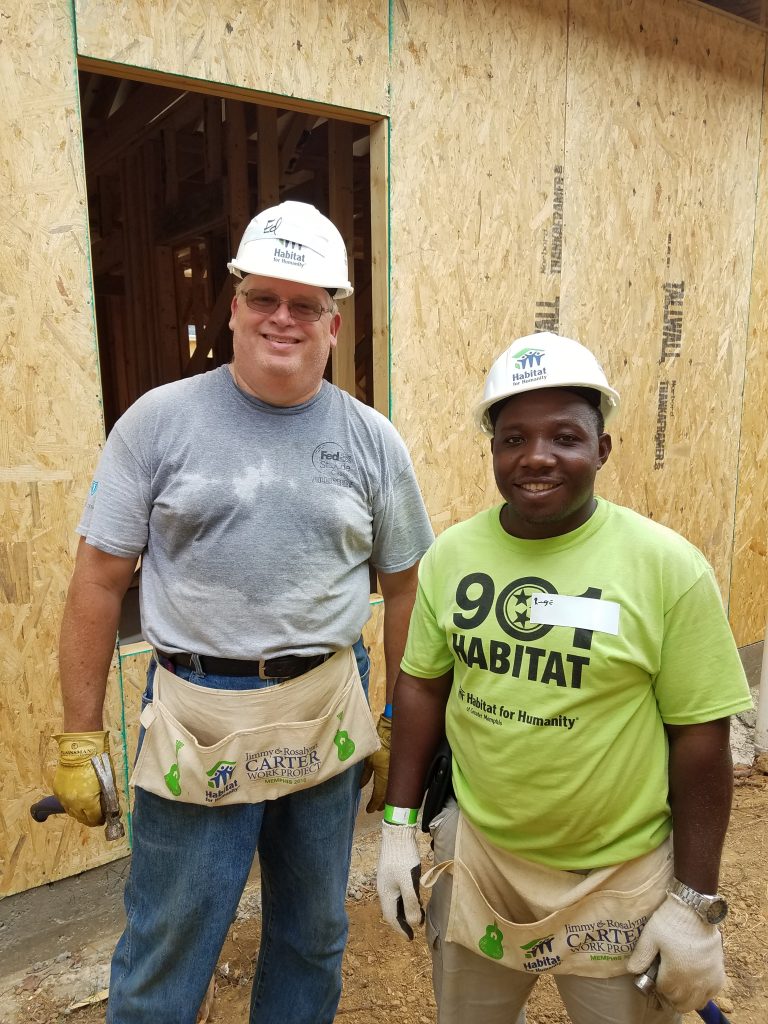When Ed Thompson took a business trip to France nearly five years ago, he didn’t think it would have such a profound impact on his life today. But this one experience of speaking a foreign language in a country that is not your own is in fact what spurred him on to become a volunteer at the Connect Language Center’s Café English.
“What very little French I knew, I was scared to death to try because I was afraid they either wouldn’t understand me or I would just botch it up so much,” Ed explained. “I only had to do that for 8 or 10 days, and these folks are here, and they have to do it day in and day out.”
With that thought in mind, Ed signed up to volunteer with World Relief Memphis after hearing a colleague talk about the organization. For months prior to that, immigration had been a hot topic in the U.S., and, after having multiple discussions with colleagues and friends about it, he decided to take the leap and turn words into actions.
“If you read so much Scripture, you see the widow, the orphan, and then you see the foreigner attached to that. So much of what God instructed Israel to do was to take care of those groups,” said Ed, a member of Crossroads Baptist Church. “As far as we are to treat them, we are to walk justly and to seek mercy.”
Ed remembers reading articles written by prominent theologians Russell Moore and Bruce Ashford about immigration, and these pieces in combination with other resources such as the book Welcoming the Stranger are also what encouraged him to take the leap.
“It was just more of a conviction for me, and the legal issue was really, to me, moot,” he said. “God gave His Word. Legal and illegal immigrants didn’t exist, there was no differentiation, and in so much of this, people seem to be more concerned about the laws than the actual how we’re treating these folks.”
Because of this, Ed decided to get involved in whatever way he could, even if it was only for an hour a week. Having experienced what it was like to try to speak another language and simply receiving a nod in return, he knew he could provide more than that for those looking to build a life in America.
“Depending on the level, the ones that weren’t quite as advanced were usually a lot more hesitant to talk,” Ed said. “The biggest challenge is encouraging them to go ahead, to try to speak. If any of the students are like me, I learn much better through trial and error and actually trying to do something than just looking at a book.”
Even if getting some students to speak was a challenge, it presented a learning opportunity for not only the student, but also for Ed and other Café English volunteers.
One time, a Hindu student had mentioned that her favorite American food was a burger. Knowing that Hindus had a special relationship with beef products, however, Ed decided to dig a little deeper. What he discovered was that she was referring to a Chick-fil-a chicken sandwich. Although it comes on a bun, he explained, we don’t call it a burger because a burger implies beef.
Laughing, Ed said that’s why they were there to help: “If you mess up, we’re here to explain that and tell you, ‘Yes, English does this stupid thing. You would think it would be this way, but it’s not.’”
In fact, one of the biggest challenges for Ed personally was rewiring his own way of speaking so that those just starting to learn English would be able to understand.
“The biggest challenge was learning how to not talk English the way we do it every day because you use so many idioms,” said Ed, who now works from home for Fedex. “I would catch myself phrasing something a certain way that I knew they didn’t know what I was talking about.”

Despite these little challenges, however, Café English and its participants grew on Ed, and he faithfully volunteered there for a year until the pandemic hit. Even then, he was one of the few volunteers who stayed, helping to take the program online for the remainder of the semester.
For three weeks, he and two others helped keep the program running online. Yet because it was during the day, few students could make it to these new times. When the semester ended, so did Café English for the time being.
Even though it couldn’t continue, Ed and his wife still plan on partnering with World Relief and the Connect Language Center in the future to help make a home for our new neighbors in Memphis.
“There’s a big need for the English help that World Relief is providing. There’s a lot of people that probably don’t realize that, through something like Café English, they could make a contribution to help these folks adjust to life here,” Ed concluded. “I enjoyed meeting people from different parts of the world and hearing their stories, and I thought it was just as much a Christian response to show up and say ‘I want to show you some love and say you’re welcome here, and I’m willing to help in whatever way I can.’”
If you, like Ed, would like to help others improve their English and get acclimated to life in the Mid-South, start filling out your volunteer application today. If you want to improve your own English like others did through the café, sign up for a class at the Connect Language Center.
Bailey Clark serves as the Communications Coordinator for World Relief Memphis. With a background in journalism and advertising, she is passionate about storytelling and its power to make a difference.

